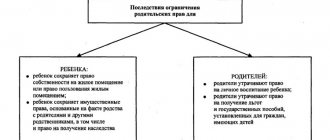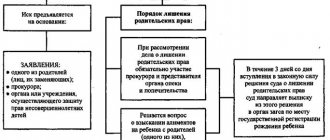Nowadays it is often said that guardianship authorities, by law, can deprive parental rights and take a child from the family at their own discretion or on the simple accusation of “well-wishers.” Is it that simple? Do all parents really need to be afraid that their child could be taken away for no reason at any time?
On what basis are parental rights deprived? Based on the decision of the district court at the request of the plaintiff in relation to one or both parents of the child - as written in paragraph 1 of Article 70 of the Family Code of the Russian Federation. This procedure does not apply to guardianship or trusteeship: a guardian or trustee can only be removed from performing duties in relation to a minor.
Procedure for deprivation of parental rights
In order to begin the procedure for depriving parental rights, it is necessary to prepare a statement of claim. It must indicate the violated right of the child and the guilt of the responding parent. Documents confirming the above are attached to the statement of claim.
A claim for deprivation of parental rights is filed in the district court at the place of residence of the defendant parent. If the statement of claim simultaneously contains a demand for deprivation of parental rights and for the collection of alimony, the plaintiff has the right to file such a statement at his place of residence.
The state fee for filing a claim for deprivation of parental rights in accordance with subparagraph 3 of paragraph 3.1 of Article 333.19 of the Tax Code of the Russian Federation is 300 rubles. The state fee when filing a claim in court for alimony is not paid.
Who can be the plaintiff:
- one of the parents, regardless of whether he lives with the child;
- persons acting in loco parentis: adoptive parents, guardians, trustees, foster parents;
- prosecutor;
- body or institution charged with protecting the rights of minors.
Documents confirming the validity of the claim:
- statement of the parent’s refusal to pick up the child from the maternity hospital;
- a court decision convicting him of a crime against the life or health of a child or spouse;
- certificate of non-payment of alimony;
- a court decision on the collection of alimony, a court order, a bailiff's calculation of the debt of the alimony payer as of the date of filing the claim in court;
- certificate of search for the debtor-payer of alimony;
- information about police calls;
- traumatologist's report;
- certificates of temporary incapacity for work;
- photographs, video, audio recordings, letters, notes;
- witness testimony confirming the circumstances under which parental rights can be deprived.
Along with these documents, you can attach reports of inspection by guardianship officers of the child’s home and at the defendant’s place of residence, as well as the conclusion of the guardianship and trusteeship department on the conditions of the child’s upbringing and maintenance.
The result of the trial will be a court decision to deprive parental rights or refuse to satisfy the application.
Within three days from the date the decision enters into legal force, the court will send an extract from this decision to the civil registry office at the place where the child’s birth was registered in order to make changes to the child’s birth certificate.
Consequences for the child
It is worth considering that for a child, after depriving his father of his rights, certain consequences also occur.
However, they are more favorable, since it is he who in this case is the party that is subject to protection and protection by the state.
The main consequences for it are:
- Changing of the living place. Since further living with one of the parents becomes impossible, he moves to the second of them or to a guardian appointed by the court. In some cases, he may be sent to an orphanage.
- Retention of all basic property rights. In particular, until he reaches adulthood (or until he is 23 years old, in the case of studying at a university), he has the right to receive certain help from his father - alimony, the amount of which depends on the amount of income and the presence of other children.
In addition, he can claim housing that belongs to his deprived parent. If it is jointly owned, the child will be one of the owners. If the housing belongs only to the father or mother, then he will have the opportunity to use it until he comes of age.
He also retains the right to inherit the property of his parent in the event of his death.
He can claim it in the same amount as other heirs established by law (if there is no will). However, his father will not inherit his property.
Another important right that the child retains is the opportunity to receive all the benefits and benefits assigned to him. Although his father is deprived of this right, it is then transferred to the mother or a guardian appointed by law.
It is obvious that all the rights that the child retains directly follow from the responsibilities remaining to his parent. At the same time, most importantly, the minor is protected from the negative influence that living with his father has on him, and also stops living in conditions that are dangerous to his health or life. And this is precisely the main purpose for which the deprivation of rights procedure is carried out.
Legal consequences of deprivation of parental rights
if one parent is deprived of parental rights
In this case, the child is transferred to the second parent. A parent deprived of parental rights is obliged to support his child, but he loses all rights based on the fact of relationship with the child in accordance with Chapter 12 of the Family Code of the Russian Federation and can no longer take part in raising the child or act as the legal representative of his child. A parent deprived of parental rights loses the right to communicate with the child and his own maintenance in old age. He is also deprived of the right to benefits and state benefits established for citizens with children.
if both parents are deprived of parental rights or the child does not have a second parent
The child is transferred to the care of authorized state bodies. In this case, adoption of a child or registration of guardianship by immediate relatives is possible no earlier than six months from the date of the decision on deprivation of rights.
rights of a child whose parent has been deprived of parental rights
The child retains the right of ownership of the residential premises or the right to use the residential premises in which he lives with the parent. At the same time, the parent-tenant of such residential premises may be evicted from it without providing another residential premises if the court finds their cohabitation impossible.
The child retains property rights based on the fact of relationship with parents and other relatives, in particular, the right to inheritance.
Consequences for the child's mother if the father is deprived of parental rights
If the father is deprived of parental rights and the child is transferred to the care of the mother, she is the only person who is responsible for raising the minor.
The mother, when the father is deprived of his rights to the child, has the opportunity to freely take the minor abroad. She will no longer need permission from her father to do this. This right plays an important role if a child requires treatment abroad or goes to another country to receive higher education.
Another advantage for the mother is that the child is not required to pay child support in the future for the maintenance of the other parent. Child support obligations are provided for by law upon the onset of parental incapacity, but for a citizen deprived of parental rights, receiving alimony is impossible. As for child support payments, a woman has the right to receive funds until the child reaches the age of majority, even if the father is deprived of rights.
If the father is deprived of parental rights, the woman does not become a single mother and cannot receive benefits for persons in this category, since according to the birth certificate the child has a father, he is obliged to pay child support and has recognized paternity.
The mother can change the child’s first, last and patronymic names in a simplified manner. A woman has the right to prohibit the father from contacting the child and participating in his upbringing.
Consequences for the parent
After the court decision to deprive parental rights comes into force, the parent loses:
- the right to child support if he becomes disabled;
- rights to all benefits provided for families with children;
- the right to inherit a child by law;
- the right to raise a child and communicate with him;
- certificate for maternity capital (it goes to the second parent or child);
- the right to live in a municipal apartment if the child remains to live in it.
The parent also loses all benefits established for families with children:
- exemption from business trips and work on weekends;
- additional leave;
- preferential labor regime;
- maternity leave for up to 3 years;
- preferential pension for women who gave birth to 5 or more children;
- part-time or part-time work week.
Consequences occur only in relation to the child in respect of whom the citizen is deprived of parental rights.
Example. After the divorce, Victor did not communicate with his son. He didn't pay child support or maintain a relationship. The boy's mother went to court to deprive him of parental rights. Victor did not object, so the court granted the woman’s request. In his second marriage, Victor became the father of 3 children. He contacted the social protection department so that the family could be recognized as having many children. The Social Security Department satisfied his request and provided a full list of benefits.
The most important
- Deprivation of parental rights – termination of the rights of the mother and father to raise and communicate with the child;
- Only a court can deprive rights;
- the procedure can be carried out in relation to the father, mother or two parents at once;
- Rights can be deprived of all children or only one of them;
- the measure applies only to blood parents (for guardians, removal from duties is provided, and for adoptive parents, adoption is cancelled);
- the opinion of a child over the age of 10 can influence the court’s decision;
- if the parent reforms, he can restore his rights.
The difference between deprivation and restriction of parental rights
The Family Code provides for 2 similar measures of liability for negligent parents: deprivation and restriction of parental rights. Let's look at their similarities and differences.
| Limitation | Deprivation | |
| Similarities | Parents are separated from their child | |
| Applicable only in court | ||
| Used if parents pose a real or potential danger to the child | ||
| Can be overturned in court | ||
| Differences | ||
| Term | For 6 months - if the parent performs their duties improperly, for life - if the parent has a mental illness | for life |
| Consequences | The child is placed under guardianship in a foster family. He cannot be adopted. | The child is placed under guardianship in a foster family. 6 months after the court decision, he can be adopted. |
Restriction of parental rights is used as a probationary period for a parent who performs responsibilities improperly. If six months is not enough for a parent to correct himself, then the guardianship department must file a lawsuit to deprive him of his parental rights.
Life situations
Let's consider popular situations.
How to submit an application to the prosecutor's office for deprivation of parental rights?
Sometimes adult brothers or sisters, grandparents, uncles and aunts, other relatives or strangers want to protect the interests of the child. But they cannot be plaintiffs in the process of deprivation of parental rights. In this case it is necessary:
- submit an application to the prosecutor's office;
- file a complaint with the guardianship department or the CDN.
State bodies themselves act for a very long time. If you only submit an application, it will be considered within 30 days. As a result, the parent can simply be registered with the KDN.
In order for the issue of deprivation of rights to be considered, it is necessary to prepare a complete package of documents for the claim. And the application must indicate the need to evaluate the evidence presented and initiate the process. In this case, the prosecutor's office will go to court within 30 days.
How to restore parental rights
A citizen deprived of parental rights has the opportunity to restore them in court. To do this you need:
- Prepare evidence that the grounds for deprivation have disappeared and the parent has improved.
- Invite specialists from the guardianship department to the house to conduct an examination.
- Take your income certificate from work.
- Obtain a certificate of no debt from the management company.
- Obtain from the bailiffs a certificate of absence of alimony arrears.
- File a claim.
- Contact the court at the place of permanent or temporary registration.
When filing an application with the court, no state fee is paid.
The opinion of a child aged 10 years or older is taken into account in the process. If the child does not want to return to his parents, the court will refuse reinstatement.
It will not be possible to restore parental rights in the following cases:
- The child was adopted.
- The child has turned 18 years old.
In other cases, there is a possibility of recovery.
When can you adopt a child after deprivation of parental rights?
If the child’s parents are deprived of parental rights, then the possibility of adoption will appear only 6 months after the court decision enters into legal force. This period is given to the parent in order to restore parental rights.
If a citizen has been deprived of parental rights, then his data is entered into the appropriate database. He will not be able to adopt children until his rights are restored.
Deprivation of parental rights in relation to a child over 10 years old
When depriving parental rights of a child over 10 years of age, the following rules apply:
- The child must be present in the process. Except in cases where the parent has committed a crime against the child or his relatives.
- The child’s opinion is taken into account, but is not decisive. He can write his opinion in a statement to the court or personally express it during the trial.
Absentee deprivation of parental rights
If a parent does not appear in the process of depriving parental rights for the first time, the meeting is postponed for 30 days. If he does not appear a second time, then the decision is made in his absence.
Features of an absentee decision:
- the defendant must receive a summons twice about the date and place of the court hearing;
- the court's decision will be stricter than if the defendant appears at the trial;
- the court decision will enter into force 60 days from the date of issuance;
- the defendant can challenge the decision if he proves that he missed the meeting for a good reason.
Is it possible to deprive a convicted person of parental rights?
A convicted citizen can be deprived of parental rights if he is serving a sentence for committing a crime against life and health:
- their children;
- spouse, ex-spouse;
- husband or wife of a former spouse;
- other relatives.
And also, if he involved children in committing a crime, involved them in prostitution, vagrancy, drinking alcohol or using drugs.
In other cases, a prisoner cannot be deprived of parental rights before release.
When will the court refuse to terminate parental rights?
Termination of parental rights is a last resort. Therefore, any doubt is interpreted in favor of the defendant.
The court may refuse deprivation in the following cases:
- the parent pays child support partially to the extent possible;
- there is no compelling evidence of failure to fulfill parental responsibilities;
- the crime against a relative or spouse was committed in self-defense or protection of a child;
- the parent maintains a close relationship with the child;
- child over 16 years of age against deprivation.
These are approximate options. Each situation is considered individually.
Who takes further custody?
As already noted, one of the main legal consequences for the father
after deprivation of rights, it is impossible for him to continue to live with the child and have any contact with him. In this regard, the most important issue that must be resolved is determining the future place of residence of the baby and appointing a person responsible for his upbringing.
This issue is resolved in court after consideration of all the circumstances of the case. In this case, the following options are possible:
The question of how to get a divorce through the court is asked by couples who have joint property and children. Have you been divorced through the courts and now need to obtain a divorce certificate? The algorithm for obtaining it is described here.
Don't know where to apply for divorce - to the court or to the registry office? Then read our article, it contains a detailed answer to this question.
The child will live with the other parent
This applies to situations where the measure of influence was applied only to the father, and the mother was not deprived of her rights.
In this case, she takes full responsibility for his upbringing.
A guardian will be appointed for the baby
This situation occurs if both the mother and father were deprived of their rights (or there was no mother to begin with).
In this case, one of the child’s close relatives who expresses such a desire can become a guardian. Most often, it becomes the subject who initially initiated the procedure for restricting and depriving rights. His appointment as a guardian occurs only after he has been checked by the guardianship and trusteeship authorities, during which his financial condition, the atmosphere in the family and the presence of a relationship with the baby are assessed. If all criteria meet the requirements of the law, official guardianship is issued.
Is it possible to return rights to parents and how to do it
The law allows for the restoration of parental rights if the father or mother:
- ended the immoral lifestyle;
- recovered from drug addiction or alcoholism;
- fulfill obligations to support children;
- changed their views on raising children, etc.
To start the restoration procedure, you need to go to court and file a claim. The text of the statement of claim states:
- name of the judicial authority;
- information about the plaintiff - the person who restores rights;
- details of the defendant – person caring for children;
- data of a third party – guardianship and trusteeship authorities;
- circumstances of the case;
- claim to court;
- proof of the circumstances set out in the claim;
- reference to legislative norms;
- list of attached documents;
- date and signature.
Documents relevant to the case are attached to the claim. This may be testimony of witnesses, certificates, acts, characteristics, etc.
If the court makes a positive decision in the case, the parents will return the rights provided for by the Family Code of the Russian Federation. This means that they will return all powers in matters of raising children, as well as all required benefits and payments.
In some cases, the court may refuse to restore parental rights. This happens for the following reasons:
- restoration of rights violates the interests of the child;
- the child is over 10 years old and is against restoring the rights of the parents;
- the child had already been taken into care and support by another family.
Any court decision is brought to the attention of the Civil Registry Office.
| Services of lawyers and advocates | Price |
| Initial free consultation (up to 30 minutes) | FOR FREE |
| Consultation in writing | from 2000 rub |
| Drawing up an application for a court order | from 1000 rub |
| Drawing up the necessary documents: claims, complaints, requests | from 3000 rub |
| Representation in court | from 5000 rub |
| Turnkey legal protection: from claim to victory | from 15,000 rub. |
| Appeal, defense in a higher authority | from 3000 rub |
| Assistance in the execution of a court decision | from 3000 rub |







